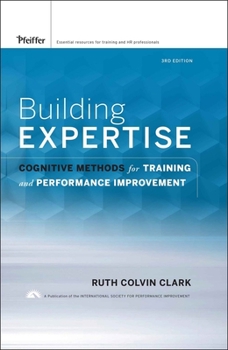Building Expertise: Cognitive Methods for Training and Performance Improvement
This third edition of the classic resource, Building Expertise draws on the most recent evidence on how to build innovative forms of expertise and translates that evidence into guidelines for... This description may be from another edition of this product.
Format:Hardcover
Language:English
ISBN:0787988448
ISBN13:9780787988449
Release Date:September 2008
Publisher:Pfeiffer
Length:512 Pages
Weight:1.85 lbs.
Dimensions:1.5" x 6.1" x 9.1"
Customer Reviews
5 ratings
Perfect blend of science and application
Published by Thriftbooks.com User , 14 years ago
Dr. Clark takes an interesting stance - if you want to develop training programs know the science that supports your approach. If you're interested in developing training programs and want to understand the science, much of which is fairly recently developed, that supports one approach over another then this is the book. It starts by reviewing the foundations of building expertise. It then reviews the literature for learning events that are proven to build expertise. It then moves to the highest levels of integration and application of the various techniques into a structured learning environment. While it is surprising to realize our most important national activity - education - has had insufficient input due to the gap between science and application - Dr Clark is driving to reduce that gap.
Cognitive Psychology for Instructional Designers
Published by Thriftbooks.com User , 14 years ago
Ruth Colvin Clark lays out the basic theories and research findings from cognitive psychology and expands on their implications for designing effective instruction. This book is intended for instructional designers who want to learn the deeper theories underlying the methods of their profession. It is equally useful for cognitive scientists who want to keep their research relevant to educational practice. Clark begins with four foundation chapters which define expertise in terms of cognitive performance and derive instructional principles designed to foster the development of expertise. The next eight chapters describe how expertise develops given the basic human constraints of working memory, attention, and long-term memory contents and structures. The book describes how initial learning becomes valuable as it is transferred to performance. The remaining chapters describe how carefully designed instruction can motivate learners and develop expertise that is adaptive to solving a variety of problems in varied contexts. This book is well-written and draws on a reasonable sample of current research literature--although the author does oversample her own work just a bit. Plain language and an extensive glossary make the book's content accessible to readers with little background in either instructional design or cognitive psychology. The diagrams and flowcharts that illustrate complex theories and processes are particularly well done, exemplifying good instructional design by highlighting key concepts and minimizing irrelevant detail. Readers may also enjoy Developing Technical Training and Graphics for Learning by the same author, who practices as well as preaches good design in her work.
Great resource and a valuable addition to the research in training
Published by Thriftbooks.com User , 15 years ago
Every trainer should buy this book! For too long, the training field (and teaching) has had little research to back up the conventional wisdom. Now, thanks to the neuroscience revolution, trainers and educators are learning how the brain actually learns. That is why Clark's book is so valuable. It has changed my teaching and training.
A gem of a book packed with useful analysis and advice
Published by Thriftbooks.com User , 20 years ago
As a high-school teacher I am finding this book an invaluable read. The combination of insights from educational psychology and practical examples of instructional design make this an essential read for all those who want to make their teaching more effective and who are dismayed by the many examples of poorly conceived e-learning that can be encountered on the web. I think this book is worth twice the price and deserves a very wide readership. It certainly amply rewards thoughtful and careful study.
Ground your training in research-based methods
Published by Thriftbooks.com User , 20 years ago
Want to know why certain instructional methods work or when they should be used? Want knowledge to improve your credibility as a learning expert with others? Based heavily on cognitive research, this book from well-known expert Ruth Colvin Clark provides the rationale for sound instructional methods.The concepts and guidelines in Building Expertise are mature, widely-accepted, and most will be familiar to readers in the training field. The book's first three chapters explain in simple terms how the brain is thought to work during learning. Each later chapter focuses on a cognitive learning process and summarizes the methods that research has shown support it. With chapter titles like "Leveraging Prior Knowledge," the organization of the book reinforces Ruth Clark's thesis. Her thesis is simple, but profound: it is instructional methods, not media, that influence learning. Some methods work better than others because of the way our brains function. Some methods work better for beginners than for advanced learners. The gems in this book are the occasional information on techniques that sometimes hurt learning and when to avoid them. While there are examples and pictures of training that follow the guidelines, this is not a how-to book. This book explains why and when to do something, not how to do it. For that reason, Building Expertise may be of interest to learning consultants and training managers, as well as to practitioners who want to deepen their knowledge of instructional design.





